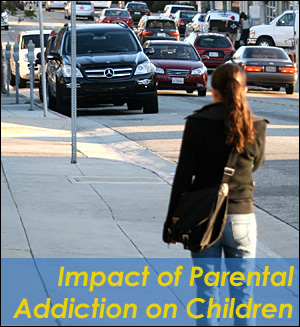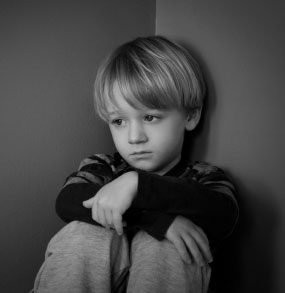The negative impact of parental addiction on children hits three main areas – physiological, psychological, and academic – and these can happen in varying degrees.
The National Institute on Drug Abuse estimates that the annual cost of substance abuse in the USA tops $600 billion. Though this figure is stunning, it pales in comparison to the less quantifiable but equally profound impact of parental substance abuse on children.
Physiological / Genetic Impact of Parental Addiction
The in utero impact of maternal addiction is often fatal for the growing fetus. The specific effects differ based on the drug of choice of the mother and the point at which the drug is introduced. The results can severely interfere with physical or mental growth. Possibly both. Mental retardation, fetal alcohol syndrome, neurological deficits, limb and organ malformations, and neonatal addiction are only part of a lengthy list.
Fetal Alcohol Syndrome is caused by exposure of a fetus to alcohol during pregnancy. FAS almost always presents with similar physical characteristics that include a thin upper lip, upturned nose, heart conditions, and immature growth. Don’t be fooled by thinking small amounts of alcohol are okay during pregnancy. Even a little bit can cause FAS. The good news is Fetal Alcohol Syndrome is completely preventable by not drinking any alcohol while pregnant.
In addition to the direct physiological effects on the fetus, a growing body of research suggests that there may be a strong genetic component to addiction. In other words, children of addicted parents may be genetically vulnerable to developing an addiction themselves later in life.
Social / Psychological Impact of Parental Addiction
Early Parentification of children of addicted parents is common.  This is a reversal of roles in that the child acts as the parent. Many children take on the role of parenting not only themselves and their siblings, but also the addicted parent. Some of these children find themselves responsible for getting younger children off to school when Mom or Dad is unavailable due to intoxication, a hangover, or being out of the home securing their next fix.
This is a reversal of roles in that the child acts as the parent. Many children take on the role of parenting not only themselves and their siblings, but also the addicted parent. Some of these children find themselves responsible for getting younger children off to school when Mom or Dad is unavailable due to intoxication, a hangover, or being out of the home securing their next fix.
Others may find themselves in the difficult position of choosing between lying about their parent’s addiction or possibly being removed from the home by social services. Older children may have to contribute to the family finances by getting a job in order to support a family whose primary provider is no longer able to work for a living.
Academic Impact of Parental Addiction
Children of addicted parents are often unable to complete assignments or are cannot attend school at all due to their parent’s condition. Anxiety related to their home situation often transfers to the academic setting, which hinders them from achieving peak performance. Even high achieving older students may be reluctant to apply for college, for example, because they understandably fear for the welfare of younger siblings, should they be away from home for long.
Fortunately, many children do make it to college, despite the unusual circumstances they endured while growing up in a dysfunctional home due to parental addiction. Some find the responsibility they earned by making things work at any cost, actually helped them be more responsible in adult life. But too often, the reverse is true and they fall prey to the environment they grew up in and emulate their parents by continuing the cycle of addiction.
The price of addiction is far too high. Sadly, not only the person struggling with addiction, but also by his or her children, his or her family, and society at large pays that price. It would be bad enough if addiction only impacted the person with the problem. But that’s not the way it works. Just like cigarette smoking, the second-hand effects of addiction impact everyone in its wake.





